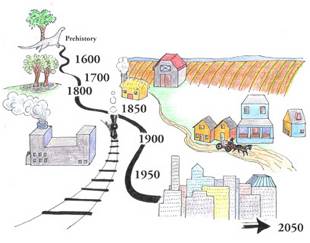 The Local History Team
The Local History Team  The Local History Team
The Local History Team I see local history as the study of past events, or of people or groups, in a given geographic area -- a study based on a wide variety of documentary evidence and placed in a comparative context that should be both regional and national… (pp.4-5)
Carol Kammen On Doing Local History
Nashville: Association for State and Local History ,1986
You will investigate: What can documents tell you about earlier generations who have lived in your area? You will explore the written and pictoral traces (photos, paintings, maps, deeds etc.) they have left behind.
What makes your area unique? What special contributions were made by people living in your area?
What writings and pictures can be found to place on a time line in your area?
How far back can you go?
What has been the experience of immigrants to your area?
Did family size change over time? Did extended families remain living close together or did they move away from each other?
What groups are often left out of your local history? How can you find out about them?
1.) Locate the oldest written document in your local library or historical museum.
If it a personal (letter, diary) document or public (contract, legal)?
Who wrote it or might have written it? Why did they write it?
What might their life have looked like then?
What insight does it give us into the history of your area of that time?
If it is a map, for example, how "true" is it and how much is propaganda or imagination?
What is its point of view? (See 4 kinds of maps at
http://historymatters.gmu.edu/mse/maps/question4.html)
If it is a photograph:
Who took the photograph?
Why and for whom was the photograph taken?
How was the photograph taken?
What can the companion images tell us?
How was the photograph presented?
2. Invention Mysteries: Select an historical tool that says something about your history, take a picture and then post it on the web. You can even make it a mystery by annotating the objects with hints.
What serves as evidence for local historians?
Examples of artifacts
diaries
letters
newspapers
local histories
writings
lists: church, army, passengers on ships, petitions, group membership, taxpayers, census
Examples of inference process – making sense of data
Reconstructions
Correlations with regional and national data
Locations of possible local experts (e.g. institutions)
Museums (what kind?)
College or university ancient history or ancient language departments
Libraries
State and private historical organizations
Archives
Additional projects for sharing could include:
1.) Writing a story. Pick a time and write a 3-page story about a family's life at a given time. Share on time line.
2.) Making a date with other classes in time; pick a shared date (after 1000 AD) and compare what was occurring at their area at that time, perhaps making entries in the time line.
3.) Consider: What will people say about your garbage! Find out what will last and what will decay?
Internet search words: history, education, time line
Internet links:
History Matters: Making Sense of Evidence
http://historymatters.gmu.edu/browse/makesense/
This site is rich and detailed, giving a good idea of historical analysis. While designed for high school students, some sections work for any grade from 5th grade on.
Colonial Williamsburg
http://www.history.org/kids/games/cooperation.cfm
Students can build a cask by selecting the right sequence of tools:
Library of Congress
http://www.loc.gov/exhibits/treasures/
A great link to the Library of Congress with some good links to primary source material. “This online version of an exhibition on permanent display in Washington D.C. is a history lover's delight. See, among many others, the contents of Lincoln's pockets on the night he was assassinated, Thomas Jefferson's handwritten draft of The Declaration of Independence, or a baseball card from the late 19th century.”
Architecture Through The Ages
http://library.thinkquest.org/10098/
This is a Think Quest site and a very informative one, but you do have to overlook a few minor problems in grammar and such. Learn about the building (and sometimes the culture) of a half dozen early civilizations including Egyptian, Greek, and Aztec. The style is straightforward and should be easy for middle and even elementary school students to comprehend.
Archiving Early America
http://www.earlyamerica.com/
This is a great resource for early American History. You can find images of actual historic documents, solve an interactive cross-word puzzle, read the Early American Review, and participate in a "Town Crier" online forum. Wonderful content and pictures!